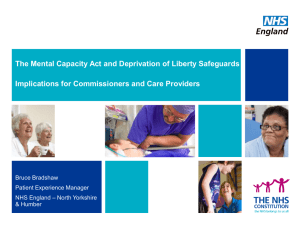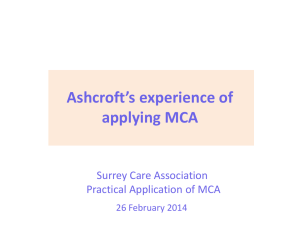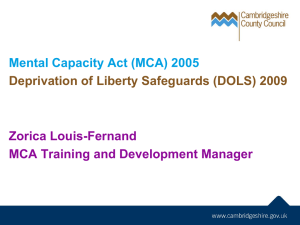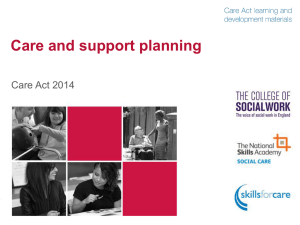Irwin Mitchell Safeguarding presentation
advertisement
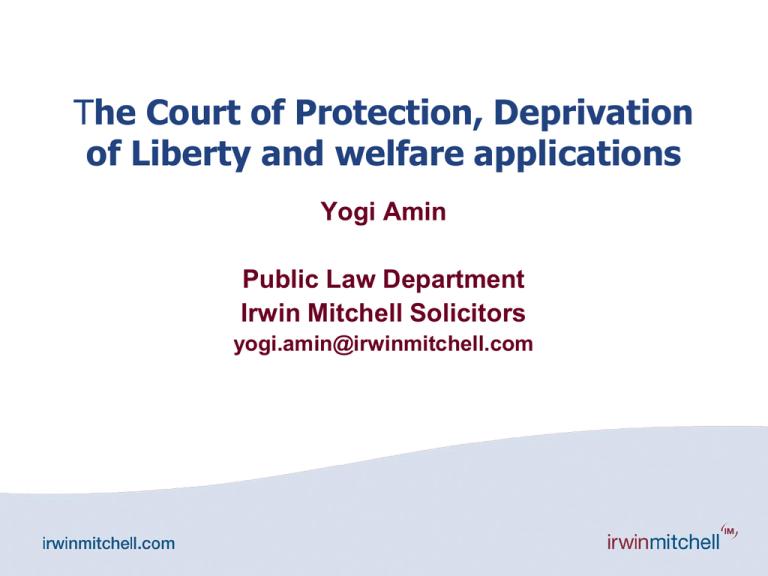
The Court of Protection, Deprivation of Liberty and welfare applications Yogi Amin Public Law Department Irwin Mitchell Solicitors yogi.amin@irwinmitchell.com Court of Protection • Role of CoP in welfare disputes • Deprivation of liberty explained • Procedures and parties to CoP proceedings • How IMCAs or other persons can bring matters to the CoP • Funding and legal representation in the CoP Functions of the Court of Protection The main functions of the Court of Protection are: • To make declarations as to whether or not someone has the capacity to make a particular decision. • To make declarations as to the best interests of a person who lacks capacity. • To make declarations as to the lawfulness or otherwise or any act done, or yet to be done, in relation to a person who lacks capacity. Additional functions of the Court of Protection: • To make single, one-off orders; for example, an order authorising the execution of a statutory will, or an order for the sale of a house and the investment of the net proceeds of sale. • To appoint a deputy to make decisions in relation to the matter in which a person lacks the capacity to make a decision. • To resolve issues involving LPAs and EPAs. • To make a declaration as to whether an advance decision to refuse treatment exists, is valid, or is applicable to a particular treatment. • To exercise an appellate jurisdiction in DoLS cases. Mental Capacity Act 2005 1. Overview of the Act – statutory principles, capacity and best interests 2. Deprivation of Liberty – as a concept 3. How does this work in practice? Deprivation of Liberty Safeguards 1. Overview of the MCA 1. Statutory Principles 2. Capacity 3. Best interests Statutory Principles • The statutory principles of the MCA provide that: Section 1 .. ‘(2) A person must be assumed to have capacity unless it is established that he lacks capacity. (3 ) A person is not to be treated as unable to make a decision unless all practicable steps to help him to do so have been taken without success. (4 ) A person is not to be treated as unable to make a decision merely because he makes an unwise decision’ (5) An act done, or decision made, under this Act for or on behalf of a person who lacks capacity must be done, or made, in his best interests (6) Before the act is done, or the decision is made, regard must be had to whether the purpose for which it is needed can be as effectively achieved in a way that is less restrictive of the person’s rights and freedom of action’. Mental Capacity Act 2005 Sections 2 and 3 define what is meant by lack of capacity. The Act contains a two-stage test of capacity: • Is there an impairment of or disturbance in the functioning of, the person’s mind or brain? • If so, is the impairment or disturbance sufficient that the person lacks the capacity to make a decision in relation to the matter in question (i.e. the matters set out above). • The term ‘best interests’ is not defined by the MCA. Section 4 of the MCA however provides a non-exhaustive statutory checklist of matters which should be taken into account. Best Interests Checklist Section 4 - Best interests 1) In determining for the purposes of this Act what is in a person's best interests, the person making the determination must not make it merely on the basis of: (a) the person's age or appearance; or (b) a condition of his, or an aspect of his behaviour, which might lead others to make unjustified assumptions about what might be in his best interests. 2) The person making the determination must consider all the relevant circumstances and, in particular, take the following steps. 3) He must consider: (a) whether it is likely that the person will at some time have capacity in relation to the matter in question; and (b) if it appears likely that he will, when that is likely to be. 4) He must, so far as reasonaby practicable, permit and encourage the person to participate, or to improve his ability to participate, as fully as possible in any act done for him and any decision affecting him. 5) ………………….[life sustaining treatment] 6) He must consider, so far as is reasonably ascertainable: (a) the person's past and present wishes and feelings (and, in particular, any relevant written statement made by him when he had capacity); (b) the beliefs and values that would be likely to influence his decision if he had capacity; and (c) the other factors that he would be likely to consider if he were able to do so. 7) He must take into account, if it is practicable and appropriate to consult them, the views of: (a) anyone named by the person as someone to be consulted on the matter in question or on matters of that kind; (b) anyone engaged in caring for the person or interested in his welfare; (c) any donee of a lasting power of attorney granted by the person; and (d) any deputy appointed for the person by the court, as to what would be in the person's best interests and, in particular, as to the matters mentioned in subsection (6). 2. What do we mean by “deprivation of liberty”? European Convention on Human Rights 1953 (ECHR) • Article 5: no one shall be deprived of his liberty save … in accordance with a procedure prescribed by law. • Article 5 (4) : everyone who is deprived of his liberty ... shall be entitled to take proceedings by which the lawfulness of his detention shall be decided speedily … • Article 6 : In the determination of his civil rights and obligations...everyone is entitled to a fair and public hearing within a reasonable time by an independent and law impartial tribunal... • Article 8: everyone has the right to respect for his private and family life… Layers of increased state legislation • Human Rights Act 1998 incorporating the ECHR. • Mental Capacity Act 2005 + Code of Practice; safeguards for those lacking capacity and the “best interests” test. • Mental Health Act 2007 including the Deprivation of Liberty Safeguards + Code of Practice. • MCA 2005 and MHA 2007 - Put in place to make law in England and Wales compliant with ECHR. Deprivation of Liberty • DOL is ultimately a legal question. • Account must be taken of the type, duration, effects and manner of implementation of the measure in question. • Number of indicators and examples in the Code of Practice • “The distinction between a deprivation of, and a restraint upon, liberty is merely one of degree or intensity and not one of nature or substance” HL v United Kingdom • Each individual case must be assessed on its own circumstances – be aware of previous cases DOL indicators • Restraints, including sedation, used to admit to placement or regularly used. • Staff exercise complete and effective control over care and movement over significant period. • Decision taken that if P makes a meaningful attempt to leave then this will be prevented. • Staff exercise control over assessments, contacts, treatment and residence. • Either P or Carers request P is discharged and this is refused. • P has lost autonomy because they are under continuous supervision and control Checklist of factors • Degree of control over care and movement. • Presence of any physical restraints. • Advance decision that the person will not be released. • Ability to maintain social contact of choice. • Refusal to accede to personal or relatives request for discharge. • Continuous supervision, monitoring or control. Codes of Practice • Professionals must have regard to the MCA Code of Practice. • There is a Code of Practice to cover DOLS. • The MHA Code of Practice covers the guidance as to when the MHA provisions are more appropriate. MCA section 5: acts in connection with care and treatment The MCA provides legal protection from liability for carrying out certain actions in connection with the care and treatment of people who lack capacity to consent, provided that: • reasonable belief that the person lacks capacity in relation to the matter in question • reasonable belief the action you have taken is in the best interests of the person. Use of restraint: Section 6 MCA • Use of restraint not protected under section 5 unless: 1) Reasonably believes that it is necessary to prevent harm; 2) Proportionate response to that risk and likely nature of that harm. • Deprivation of Liberty is excluded Summary – Deprivation of Liberty • Summarise what the elements of the care plan will be measured against the list above. • Consider the effect of the arrangement on the person’s individual freedom and expressed intentions. • Assess the views of those concerned for the persons welfare. • Overall cumulative effect going beyond mere “restriction”? • If DOL – follow the DOLS process or apply to the COP. CoP and Welfare CoP's welfare jurisdiction is versatile and can include: • Disputes about change of residence: • • • e.g. P lives at home, local authority believes in P's best interests to move into residential care, P or P's family disagrees e.g. P is in hospital and fit for discharge, dispute arises about where P to be placed upon discharge Disputes about serious medical treatment, e.g: • • • withdrawal of life-sustaining treatment abortion Surgical or other serious medical treatment where best interests not clear CoP and Welfare • CoP can also adjudicate on: • Disputes about P's contact with others • Disputes about P's capacity to marry • Disputes relating to P's proposed travel abroad • Disputes about P's capacity to consent to sexual contact • Disputes relating to P's social care CoP and capacity • Where there is a dispute as to capacity, s.48 MCA applies: • “The court may, pending the determination of an application to it in relation to a person (“P”), make an order or give directions in respect of any matter if— • (a) there is reason to believe that P lacks capacity in relation to the matter, • (b) the matter is one to which its powers under this Act extend, and • (c) it is in P’s best interests to make the order, or give the directions, without delay.” • “Reason to believe” has been interpreted by the Courts as meaning “sufficient evidence to justify a reasonable belief that P may lack capacity in the relevant regard”. How are CoP proceedings commenced? • Typical scenario: • P lacks capacity, there is a dispute as to their best interests, and that dispute cannot be resolved on the ground and/or urgent intervention from the court is required. • Proceedings can in that scenario be issued (on an urgent basis) seeking best interests declarations from the court. • This will result in a judicial determination as to best interests, which all parties must adhere to – financial deputy, case manager, local authorities etc. Who makes the application to CoP? • In practice the Court will expect the relevant local authority (i.e. the council for the relevant social services department) or NHS trust to make the application • MCA Code of Practice, para 8.8: – “For cases about serious or major decisions concerning medical treatment ... the NHS Trust or other organisation responsible for the patient’s care will usually make the application. If social care staff are concerned about a decision that affects the welfare of a person who lacks capacity, the relevant local authority should make the application.” • However, applications can be brought by P, or by a family member or by a person who is interested in P's welfare. • Para 7(2) MCA IMCA (General) Regulations 2006 states: – “IMCA has the same rights to challenge the decision as he would have if he were a person (other than an IMCA) engaged in caring for P or interested in his welfare” Who are the parties to CoP proceedings? • The party making the application to the CoP is known as the Applicant. • Other parties are the “First Respondent”, “Second Respondent”, etc • Parties to proceedings can include: • • • • • The local authority The NHS Trust Family members ‘P’ Where P is a party, and P lacks litigation capacity, the Court will appoint a litigation friend to act on behalf of P. Can an IMCA be litigation friend? • While the Code does not refer to an IMCA bringing proceedings as P’s litigation friend, the Code does envisage IMCAs bringing matters to the attention of the Court • Para 10.37 MCA Code of Practice: – “In particularly serious or urgent cases, an IMCA may seek permission to refer a case to the Court of Protection for a decision. The Court will make a decision in the best interests of the person who lacks capacity.” • Para 10.38 MCA Code of Practice: – “The first step in making a formal challenge is to approach the Official Solicitor (OS) with the facts of the case. The OS can decide to apply to the court as a litigation friend (acting on behalf of the person the IMCA is representing). If the OS decides not to apply himself, the IMCA can ask for permission to apply to the Court of Protection. The OS can still be asked to act as a litigation friend for the person who lacks capacity.” Who can act as litigation friend? • Rule 140 of CoP rules says: – 1) A person may act as a litigation friend on behalf of [P] if he— – (a) can fairly and competently conduct proceedings on behalf of that person; and – (b) has no interests adverse to those of that person. • Thus, if an IMCA or some other person keeps in mind his/her duties and general responsibilities and considers that there is no conflict between that role and that of litigation friend, there is nothing in Rule 140 to prevent them from acting as litigation friend. Why should I act as litigation friend? • The Official Solicitor is litigation friend “of last resort”. • If contemplating bringing proceedings as litigation friend for P, good practice is to inform the OS. However, if another person is willing and able to conduct proceedings fairly and competently, the OS will usually be happy for someone else interested in P’s welfare to carry out role of litigation friend. • In practice, OS rarely brings makes applications to CoP on behalf of P. In circumstances where P’s capacity or best interests need to be determined by the CoP, and where the local authority, NHS trust or family members decline to make the application, it is left to IMCA or some other person to make the application. • IMCA is permitted to make application in his/her own right, but would need to fund his/her own legal representation. • If applying in P’s name as P’s litigation friend, P will often qualify for legal aid. Procedure and costs in the CoP • The person wishing to apply to the CoP on P’s behalf should approach a solicitor specialising in MCA and CoP work for advice. • The solicitor will investigate funding options, including P’s eligibility for legal aid. • Most solicitors will not charge for initial advice while funding options are being investigated. • Acting as litigation friend does not require specialist training or legal expertise. • Solicitors will advise the person on their role and duties as litigation friend. How will the CoP help P? • CoP can make declarations: – That P has, or lacks, capacity – That it is in P’s best interests to reside in place A – Authorising deprivation of liberty – That it is in P’s best interests to undergo particular medical treatment – Prohibiting named persons from having contact with P (injunction order) GvE [2010] EWHC 621 (Fam) 1. E was deprived of his liberty when he was placed in a respite unit, and later in a supported tenancy, where staff exercised complete control over his care, assessments, treatment, movement and contact. 2. The deprivation of liberty was a breach of E's right to liberty pursuant to Art 5 ECHR because the local authority failed to comply with the procedures laid out in the MCA, either by applying the DOLS procedure under Schedule A1, or by applying to the Court under ss 16 and 48. 3. The local authority also breached E's right to a family life pursuant to Art 8 ECHR by removing him from his foster mother, failing to give adequate consideration to his family life, failing to involve his foster mother in the decision making process and impeding contact with his foster mother for several months. Example Orders from the COP - Injunction order • AND UPON District Judge [xxxx] being satisfied that an interim injunction order should be made against [XXX] as being necessary, proportionate and in the best interests of AB. • IT IS ORDERED THAT • Until further order [XXX] is forbidden – from staying overnight with MW at any address; and – from having any direct contact with AB between the hours of midnight and 8am. Order to prevent marriage and leaving the jurisdiction • CD and EF are until further order of the Court prohibited (whether by themselves or by instructing or encouraging any other person) from: – Causing or encouraging GH to leave accommodation arranged for her by the local authority or the X Day Centre. – Causing or allowing GH to undergo any civil or religious ceremony of betrothal or marriage. – Taking GH out of the jurisdiction of England and Wales. – Applying for or obtaining any passport or other travel document in the name of GH. Deprivation of Liberty Order • AND UPON the court being satisfied that a) IJ has a mental disorder of a nature and degree warranting compulsory confinement and, b) that confinement as set out below is necessary and appropriate: • It is lawful, being in IJ’s best interests, that: – She reside at XXXX or such other accommodation as arranged for her by the local authority; and – the local authority by its employees or agents (including staff at XXXX) may use reasonable and proportionate measures to prevent IJ from leaving such accommodation, if so advised and in accordance with the care plan dated xxxx. There be liberty to any party to apply to discharge or vary this part of this order at any time on 48 hours notice to all parties. COP - A tool for safeguarding • Disputes over capacity and best interests should be resolved by all interested parties reaching agreement after consulting the principles of the Mental Capacity Act • In deprivation of liberty cases either a court order or a DOLS authorisation is required • Where it is disputed as to whether the care arrangements amount to a deprivation of liberty – an application should be made to the Court of Protection • A balance must be struck between the risks and benefits for P Yogi Amin Public Law Department Irwin Mitchell Solicitors yogi.amin@irwinmitchell.com
